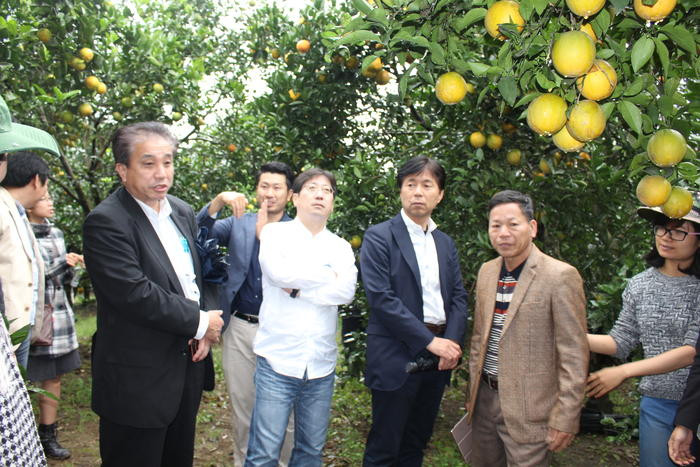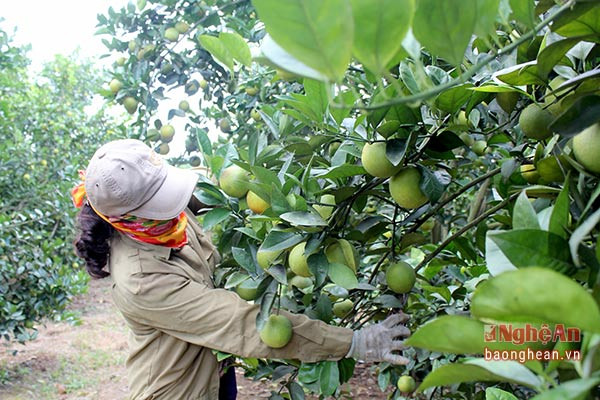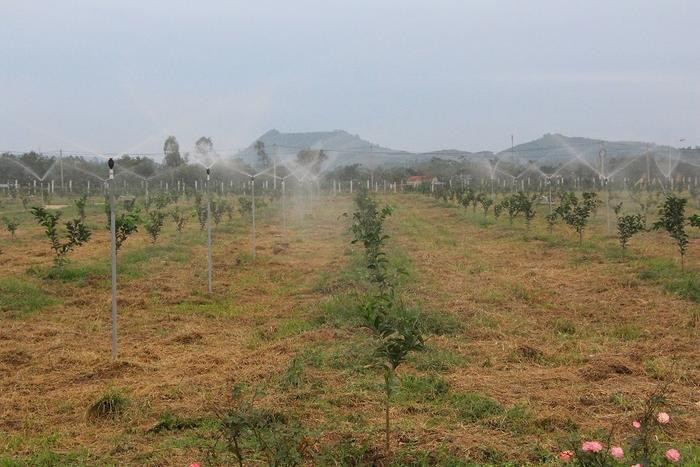Orange seed sources are chaotic, lacking parent trees.
(Baonghean) - Orange varieties in Nghe An are being grafted spontaneously in the garden, then supplied to orange growers in the region. In addition, the varieties are also sold at all seedling businesses and rural markets. Orange growers, because they do not understand the role of seedlings, buy floating varieties to plant and may suffer the consequences.
» Orange growers in Nghe An are struggling because of poor quality varieties.
Vinh orange products are popular with consumers, oranges have high economic value, so the movement of growing commercial oranges in the localities of Quy Hop, Nghia Dan, Tan Ky, Yen Thanh, Thanh Chuong... is developing strongly. Of the current area of 5,096 hectares of Nghe An province, Quy Hop has 2,787 hectares, followed by Nghia Dan district with 436 hectares, Thanh Chuong with 331 hectares, Yen Thanh with 308 hectares, Con Cuong with 306 hectares, Anh Son with 115 hectares, Tan Ky with 141 hectares, the area of oranges is showing signs of increasing.
The amount of orange seedlings consumed in the area is increasing, many organizations and individuals take advantage of the lack of knowledge of orange growers, supplying varieties that are not guaranteed.
 |
| A delegation from Japan's JICA visited an orange garden in Quy Hop. Photo: Tran Chau |
In the orange growing areas of Quy Hop district, there are 9 orange seedling production facilities in households. Entering the seedling garden of Mr. Tran Van Quang, Nam Loi hamlet, Van Loi commune, Quy Hop district, one sees quite eye-catching rows of orange seedlings. Mr. Tran Van Quang - the owner of the seedling garden introduced: "Here we accept grafting and produce and sell all kinds of orange seedlings. People in the area bring the buds of orange trees (orange garden owners choose the mother) to us to graft into seedlings, the labor cost is 1,000 VND/grafted bud. If you buy seedlings that we have already grafted and just bring them home to plant, the price is 14,000 VND/tree".
Starting to produce seedlings in early 2016, up to now, in Mr. Quang's family nursery, there are thousands of seedlings ready to supply to orange growers. Each year, his facility produces about 20,000 orange seedlings of all kinds, supplying orange growers in the region. The seedlings he produces are mainly grafted, the parent trees are selected from orange trees that grow well in the region, and are not planted in isolation. However, when we mentioned the issue of seedling warranty, Mr. Quang asserted: "We always ensure the quality and reputation of the seedlings we produce, so growers can rest assured."
The practice of grafting orange trees by selecting the original orange trees in the orange garden has unintentionally left consequences for orange growers. That is, the quality of the orange garden will not be known and no one guarantees the orange variety.
Mr. Le Quang Hoa's household - owner of an orange garden in Minh Dinh hamlet, Minh Hop commune is an example. To have a source of seedlings, Mr. Hoa hired someone to graft Xa Doai oranges with golden hearts right in the garden, by choosing the parent tree right in the orange garden. As a result, after 4 years of care, up to 1/3 of the trees were infected with yellow tea disease.
Mr. Hoang Minh - Director of Xuan Thanh Agricultural Company Limited said: In the past, our company produced orange varieties, but because there were too many orange varieties of unknown origin sold on the market, while the management was not good, orange growers were greedy for cheap and bought poor quality varieties. As a result, many orange gardens did not ensure quality, had many pests and diseases, the most obvious sign was the high rate of "dumb" oranges every year, causing orange growers to lose income. The production of varieties was therefore no longer of good quality.
Con Cuong district currently has 340 hectares of oranges, which have increased the income of local people, becoming a key crop, with each hectare of oranges harvested, after deducting all costs, giving a profit of 300 - 350 million VND/year. Here, the orange variety is also mainly bought by households in Quy Hop. Mr. Luu in Yen Khe village, Con Cuong said that he bought 550 Mat orange trees in Quy Hop and was lucky to get a good variety. He is buying 400 Xa Doai orange trees, but they have not yet been harvested. Mr. Luu added that many households in Yen Khe are not so lucky. Many households also buy orange varieties in Quy Hop but the fruit is very little.
 |
| Quy Hop oranges are in harvest season. Photo courtesy |
Yen Thanh is a locality that has developed a fairly strong orange acreage in recent years. Therefore, the demand for orange varieties used every year is quite high. Mr. Nguyen Huu Binh - the owner of a large orange garden in Dong Thanh commune, who has decades of experience growing commercial oranges, said: Growing orange varieties is a very important issue, it determines the quality of oranges, productivity and business life. If you buy poor quality varieties, orange trees will be susceptible to disease, from which orange growers will fail. Mr. Binh added: His oranges were planted nearly 10 years ago, although he bought the varieties from a specialized production unit in Hanoi, they still have some common diseases.
No orange tree yet
At the meetings of the Steering Committee for Exploitation and Development of Geographical Indications of Cam Vinh, it was assessed that: Nghe An orange varieties produce ripe fruit concentrated from October to April of the following year, the remaining time there are no ripe oranges to meet the needs of consumers. Some orange gardens have been planted for many years, the varieties have degenerated, giving low productivity and quality, so it is necessary to rotate and replace them. Meanwhile, currently the method of producing orange seedlings in the province is mainly done by manual grafting and grafting.
However, currently, the trees supplying grafts and cuttings are mainly taken from orchards that have not been recognized by competent authorities. The grafts and cuttings are taken from mother trees that are not grown in isolation in greenhouses or net houses, so diseases cannot be controlled. Orange varieties sold on the market do not have origin codes according to regulations. Many low-quality orange varieties have been planted in the past but have not been replaced by new varieties with high yield and quality; the work of checking, inspecting and sampling seedlings still faces many difficulties.
 |
| High-tech orange growing in Nghia Dan district. Photo: Tran Chau |
Mr. Truong Van Hien - General Director of Nghe An Agricultural Materials Corporation added: In addition to the unqualified orange varieties, the lack of process and science in caring for oranges also leads to the situation of "dull" oranges. For example, sick oranges are treated with pesticides, and if oranges are infected with pests, pesticides are used, and gradually the oranges degenerate and become inert.
According to the investigation results of the Department of Crop Production and Plant Protection, in the Phu Quy area, there are currently 7 enterprises registered to produce and trade fruit tree seedlings, producing millions of seedlings each year to supply the market such as: Phu Quy Fruit Tree and Industrial Tree Research Center; Xuan Thanh Agricultural One Member Co., Ltd.; Yen Tinh Rubber Joint Stock Company; North Central Forestry Seedling Production Center; An Ngai Agricultural One Member Co., Ltd.; Seedling Center of 1/5 Cooperative and 3/2 Agricultural - Industrial Co., Ltd.
In addition, many households and individuals produce seedlings themselves to expand their acreage or sell them to the market. In addition, many fruit varieties from other localities are also brought into the Nghe An market for consumption. The origin of fruit trees is unclear, and seedlings produced and sold are almost never labeled according to regulations, so controlling the quality of seed sources is facing many difficulties.
Many units participate in the production and trading of fruit tree varieties like that, but currently in the whole province there is only 1 unit with seed sources from parent trees, parent tree gardens. That is Yen Tinh Rubber Joint Stock Company (Nghia Dan district) with 3 hectares of parent tree gardens including PQ tangerines, green-skinned grapefruits, Dien grapefruits, four-season lemons, peach-heart lemons, and wax avocados, which were certified by the Department of Agriculture and Rural Development in 2015.
In addition, the Center for Fruit and Industrial Tree Research is proposing that the Ministry of Agriculture and Rural Development issue a certificate for Hong Quang Tien grapefruit as a new agricultural crop variety. All other organizations and individuals producing and trading fruit seedlings in the province have not been granted certificates for parent trees and parent tree gardens. Therefore, the quality of seedlings consumed in the market is almost uncontrolled, which poses a potential risk of poor quality seedlings, especially genetic resources and diseases. This affects the production results of fruit growers.
| Mr. Tran Cong Ninh - Director of the 19/5 Fruit Tree Agricultural Cooperative said that the standard orange variety currently costs about 30,000 VND/pot, while the floating variety on the market costs only 10,000 VND - 15,000 VND/pot. |
(To be continued)
PV Group
| RELATED NEWS |
|---|
